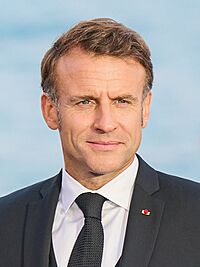President of France facts for kids
Quick facts for kids President of the French Republic |
|
|---|---|
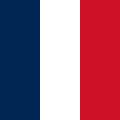
Presidential standard
|
|
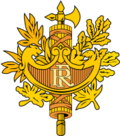
|
|
| Executive branch of the French Government | |
| Style |
|
| Member of |
|
| Residence | Élysée Palace |
| Seat | Paris, France |
| Appointer | Popular vote |
| Term length | Five years,
renewable once consecutively
|
| Constituting instrument | Constitution of France (1958) |
| Inaugural holder | Louis-Napoléon Bonaparte |
| Formation |
|
| Deputy | President of the French Senate (in the presidential line of succession) |
| Salary | €182,000 per annum |
The President of France is the leader of France. This important job is officially called the President of the French Republic. In French, it's Président de la République française. The president is the head of state for France. They are also the commander-in-chief of the French military. This means they are in charge of the country's defense.
The president's role has changed over time. Different rules have been set by various constitutions since the Second Republic. The president works closely with the prime minister and the government of France.
Besides leading France, the president has other special roles. They are a co-prince of Andorra, a small country in the Pyrenees mountains. They are also the grand master of the Legion of Honour, which is France's highest award. The president also protects the Institut de France, a group of important French academies.
The current president is Emmanuel Macron. He became president on 14 May 2017. He was re-elected for a second term on 7 May 2022.
Contents
History of the Presidency
The idea of a president for France first came up in 1830. This was during the July Revolution. The job was offered to the Marquis de Lafayette. But he said no, and Louis Philippe became King instead.
Eighteen years later, in 1848, the title of president was created. This was during the start of the French Second Republic. The first person to be elected president by the people was Louis-Napoléon Bonaparte. He was the nephew of Emperor Napoleon. Bonaparte was president until he took control of the government in 1851. He then declared himself Emperor Napoleon III.
Under the French Third Republic (starting in 1875), the president was at first very powerful. But soon, the power shifted. The president lost much of their control over the law-making body, called the parliament. This made France more of a parliamentary system. In this system, the prime minister and parliament have more power. This continued for 80 years.
After World War II, the French Fourth Republic was created. The president's role became mostly ceremonial. This means they had little real power.
The Constitution of the French Fifth Republic, adopted in 1958, gave the president much more power. In 1962, a public vote changed the rules. From then on, the president would be directly elected by all citizens. Before this, they were chosen by a special group. In 2000, another public vote shortened the president's term. It went from seven years to five years. A rule was added in 2008. It said a president can only serve two terms in a row.
How the President is Elected
Since 1962, the president has been chosen by a direct vote of the people. The presidential term was changed from seven to five years in 2000. The first election with the shorter term was in 2002.
Term Limits
A rule from 2008 says a president cannot serve more than two terms in a row. Before this, there were no limits. François Mitterrand and Jacques Chirac both served two full terms. Emmanuel Macron was re-elected in 2022. He is the fourth president to win re-election.
The Election Process
French presidential elections use a special system. It's called "run-off voting." This makes sure the winner always gets more than half of the votes.
- In the first round, many candidates can run.
- If no one gets more than 50% of the votes, the top two candidates go to a second round. This is the "run-off."
- The person who wins the run-off becomes president.
To become an official candidate, people need support from over 500 elected local officials. Most of these are mayors. These officials must come from at least 30 different areas of France. Each official can only support one candidate.
Campaign spending is carefully watched. There's a limit on how much money candidates can spend. The government helps pay for campaigns. Advertising on TV is not allowed. But candidates get official time on public TV. An independent group checks all election and party money.
Presidential Powers
France has a semi-presidential system. This means the president has a lot of power. This is different from many other European countries. The prime minister and Parliament handle most daily tasks. But the president has a big say in national security and foreign policy.
The president's biggest power is choosing the prime minister. However, the French National Assembly can remove the prime minister's government. So, the president must pick someone who has the support of most people in the Assembly. Since 2002, elections for the president and the Assembly happen close together. This usually means the president's party has a majority in the Assembly. The president also makes sure the government works well.
- If the president and the Assembly have different political views, it's called "cohabitation". In this case, the president's power is less. The prime minister and Assembly have more control.
- If the Assembly agrees with the president, the president can be more active. They can influence government plans more easily. The prime minister is then more of the president's choice. They can be replaced if they become unpopular.
Since 2002, the president and the Assembly both serve five-year terms. Their elections are close together. This makes "cohabitation" less likely.
Here are some of the president's powers:
- The president officially signs laws into effect.
- They can ask Parliament to look at a law again, but only once.
- The president can ask the Constitutional Council to check if a law follows the Constitution.
- The president can dissolve (close down) the French National Assembly. This means new elections must be held.
- The president can ask the public to vote on certain laws or treaties in a referendum.
- The president is the leader of the armed forces.
- The president can order the use of nuclear weapons.
- The president names the prime minister. They also name and remove other ministers, with the prime minister's advice.
- The president names most government officials.
- The president names some members of the Constitutional Council. Former presidents are also members.
- The president welcomes foreign ambassadors.
- The president can grant a pardon to people who have been found guilty of crimes. This means they can reduce or remove their punishment.
Most decisions made by the president must also be signed by the prime minister. But some actions, like dissolving the National Assembly or choosing the prime minister, do not need the prime minister's signature.
Key Constitutional Powers
The French Constitution describes the president's powers.
- The president makes sure the Constitution is followed. They ensure the government works properly and the country continues to function. They protect France's independence and agreements with other countries.
- The president appoints the prime minister and other government members.
- The president leads meetings of the Council of Ministers (the cabinet).
- The president signs laws passed by Parliament. They can ask Parliament to reconsider a law once.
- The president can propose laws for a public vote (referendum) with the government's agreement.
- The president can dissolve the National Assembly after talking with the prime minister and others. New elections must happen within 20 to 40 days.
- The president signs official orders and decrees. They appoint people to civil and military jobs.
- The president welcomes foreign ambassadors and sends French ambassadors abroad.
- The president is the commander-in-chief of the armed forces. They lead national defense meetings.
- In very serious emergencies, the president can take special measures. They must tell the nation about these measures. This power has only been used once, during the Algerian War in 1961.
- The president has the right to grant pardons.
- The president can send messages to Parliament. They can also give a speech to the Congress of France in Versailles.
Presidential Pardons
The president can grant a pardon. This means they can forgive a crime or reduce a sentence. This is different from an amnesty, which makes it as if the crime never happened. Before 2008, there were "presidential amnesties" after elections. These would forgive minor crimes. This practice was stopped because some people thought it encouraged minor offenses before elections.
Who Takes Over if the President Can't Serve?
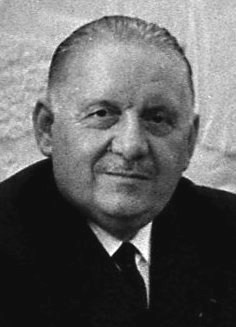
If the president dies, resigns, or is removed from office, the president of the Senate takes over temporarily. Alain Poher is the only person who has done this. He served twice: in 1969 after Charles de Gaulle resigned, and in 1974 after Georges Pompidou died.
When the Senate president is acting president, they cannot dissolve the National Assembly. They also cannot call for a referendum or change the Constitution. A new presidential election must be held within 20 to 35 days. The Senate president can only be acting president for a maximum of 50 days.
If the president cannot attend meetings, they can ask the prime minister to go in their place. This happens if the president is traveling, sick, or having surgery.
Presidents Who Died in Office
Four French presidents have died while in office:
- Sadi Carnot, who was killed on 25 June 1894, at age 56.
- Félix Faure, who died on 16 February 1899, at age 58.
- Paul Doumer, who was killed on 7 May 1932, at age 75. He was the oldest president to die in office.
- Georges Pompidou, who died on 2 April 1974, at age 62.
Pay and Official Homes
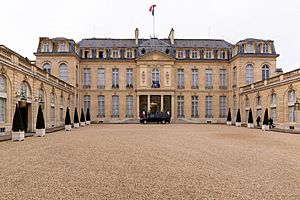
The president of France receives a salary. As of 2008, it was about €20,963 per month. This includes a residence payment and a function payment. The salary is similar to the prime minister's.
The main official home and office of the president is the Élysée Palace in Paris. Other presidential homes include:
- The Hôtel de Marigny, next to the Élysée Palace, used for foreign guests.
- The Château de Rambouillet and the Domaine national de Marly, sometimes used for official meetings.
- The Fort de Brégançon, in southeastern France, is the official vacation home. It is now also a national monument.
- La Lanterne became an official presidential vacation home in 2007.
Latest Election
The most recent presidential election was the 2022 French presidential election.
Pension and Benefits for Former Presidents
French law says that former presidents get a lifetime pension. They also receive a special diplomatic passport. They become members of the Constitutional Council.
Former presidents also get staff, an apartment or office, and other benefits. This system was set up in 1981. In 2008, it included a security team, a car with a driver, and an office or living space. They also had funds for seven assistants.
In 2016, changes were made to this system. Former presidents no longer get a car with a driver. The number of staff for their living space was reduced. But they still have a state apartment or house. Train tickets are also available for official trips. The security for former presidents remains the same.
Lists Related to French Presidents
- List of presidents of France
- List of presidents of France by tenure
- French presidential inauguration
See also
 In Spanish: Presidente de Francia para niños
In Spanish: Presidente de Francia para niños
 | Shirley Ann Jackson |
 | Garett Morgan |
 | J. Ernest Wilkins Jr. |
 | Elijah McCoy |


